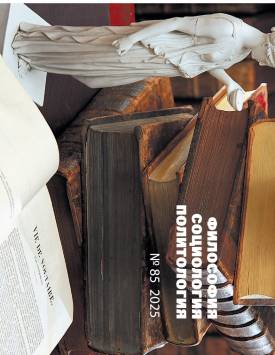On a theoretical and methodological error (or misconception) in social sciences and humanities discourse and ways to overcome it
The article discusses two popular interrelated and interdependent theses: the statement of total relativism and the assertion of the ideological bias of the socio-political (theoretical and practical) judgments put forward by researchers, publicists and social activists. Three possible variants of such a discussion and the consequences arising from their application are highlighted. The first is the recognition of the current state of affairs. As a consequence, it creates a paradox of self-reference and blocks the theoretical possibility of any further ways of discussing these theses. The sexond is the possibility of a meta-position, when the subject of such statements believes that he is working at a higher level of analysis. even legitimacy of choosing the most preferable system of values at the present time. Ankersmit’s ideas on the role of moral values in historical knowledge are used as a theoretical and methodological guideline in choosing the third path, namely, his assertion that moral and political values provide prospects for discovering historical truth. Ankersmit offers two criteria for choosing a preferred historical picture. Firstly, one must choose a picture that has the largest scale or opens the way to a wide and varied empirical material. Secondly, the picture that is preferable is the one that has a more risky, more dangerous, in the sense of original, character (or generates more original consequences), but cannot be rejected on the basis of existing knowledge. Ankersmit’s thesis is the following: one should prefer those political and moral values that are inspired by a stronger and more successful representation of the past and, moreover, that ensure the creation of such a picture. It is argued that Kant’s moral theory, whose fundamental principle is respect for human dignity, can be considered the most suitable candidate for this role. A specification of this principle is proposed. It can be interpreted as a criterion for distinguishing moral demands from non-moral ones; as a principle that lies, can and should lie at the basis of all actual and potential maxims; as a concretization of the idea of morality. The openness of the idea of dignity is emphasized, i.e. the possibility and even necessity of re-definition, due to the fact that new circumstances may reveal some new features of morality that would be more appropriate to encompass within the idea of dignity.Based on the ideas of Linchenko and Buller, it is argued that the principle of dignity can be laid at the basis of historical ethics, which can be interpreted as a type of applied ethics. In conclusion, the difficulties and prospects of using applied ethics as a set of values in the field of historical knowledge and contemporary social practice (using the example of cancel culture) are discussed. It is argued that the prospects for its application should be sought in the direction proposed by Ankersmit. It is also noted that the principle of dignity can be considered as a necessary platform for the implementation of an actual or potential dialogue between various theoretical and ideological positions in the interpretation of events in distant and recent history. The author declares no conflicts of interests.
Keywords
historical knowledge, moral values, deontology, Kant’s ethics, principle of dignity, historical ethics, shared historyAuthors
| Name | Organization | |
| Syrov Vasily N. | Tomsk State University | narrat@inbox.ru |
References

On a theoretical and methodological error (or misconception) in social sciences and humanities discourse and ways to overcome it | Tomsk State University Journal of Philosophy, Sociology and Political Science. 2025. № 85. DOI: 10.17223/1998863X/85/11
